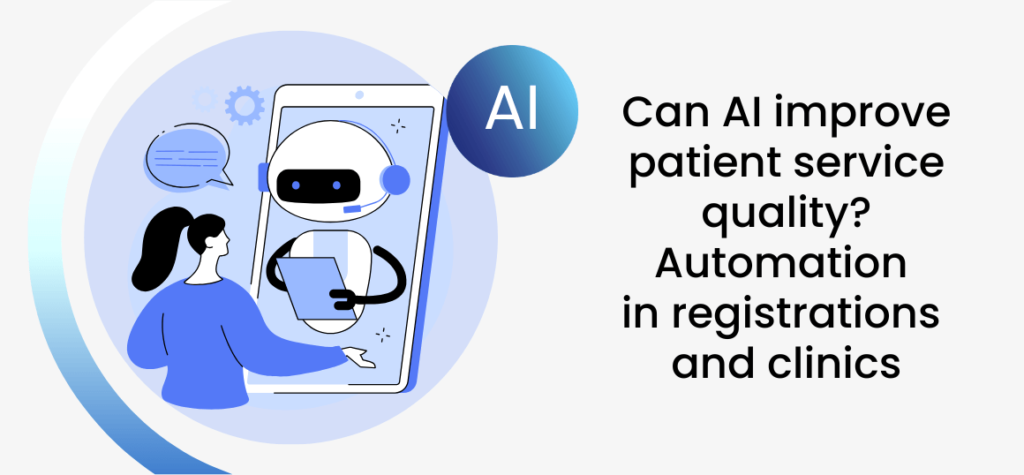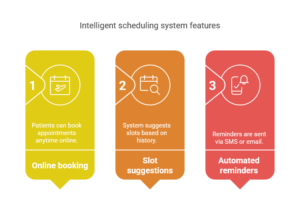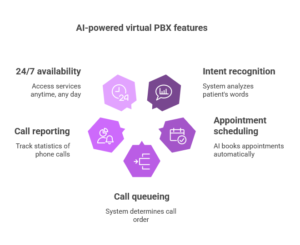Can AI improve patient service quality? Automation in registrations and clinics

A modern medical facility starts with professional and reliable registration
Today’s healthcare systems face numerous challenges — from overloaded registration desks and staff shortages to the need for efficient and empathetic patient care. In this context, artificial intelligence (AI) is emerging as a powerful tool to enhance service quality, especially through the automation of administrative processes in clinics and registration units.
Automated patient scheduling – fewer queues, more time for care
One of the most obvious applications of AI in healthcare is the automation of patient registration. Traditional methods handled by medical staff often lead to long wait times and increased per-patient service costs. Automating this process using AI-driven technologies — such as online booking systems, smart calendars, and integrations with HIS systems — can significantly boost system efficiency without the need to hire additional staff.
AI enables the implementation of intelligent scheduling systems that:
- allow patients to book appointments online 24/7;
- suggest the earliest available slots based on medical history and patient preferences;
- automatically send reminders via SMS or email.

According to a study by Harvard Business Review Analytic Services, medical facilities that implemented AI-based scheduling automation observed:
- an average 17% reduction in missed appointments (“no-shows”) thanks to reminder systems and auto-confirmation;
- a 60% reduction in average registration time;
- an increase in patient satisfaction (NPS) by 20–25 points.
A real-world example of this success can be seen in the solutions implemented at Gizińscy Medical Center, where AI and voicebot technologies drastically improved scheduling and patient communication.
AI-powered registration systems can also prioritize appointment requests (e.g., urgent symptoms) and optimize physicians’ schedules based on historical data, leading to more effective use of medical staff time and better access to care for patients.
Call or check online? Chatbots as the communication infrastructure for managing medical information
Chatbots serve as intelligent knowledge interfaces capable of engaging in contextual and dynamic conversations with patients. Their role is not to make clinical decisions, but to manage medical information and coordinate communication between the patient and the healthcare facility. According to data from Salesforce Health Cloud, a well-configured chatbot can resolve 65–80% of patient inquiries without requiring human staff involvement.
In outpatient settings, chatbots can:
- answer questions about medical instructions (e.g., dosage, drug interactions, or test preparation);
- provide educational content tailored to age, gender, and condition (e.g., for chronic illnesses, mental health, or preventive care);
- support follow-up processes — such as collecting post-visit data or reminding patients about scheduled lab tests.
Voicebots in medicine – convenience and a way to avoid waiting
Voicebots, in turn, are used not only for automating call center services, but also for proactive outreach to patients. They can conduct short health surveys, monitor symptoms in real time (e.g., in remote cardiac monitoring programs), or notify patients about operational changes at the facility.
Powered by ASR (Automatic Speech Recognition) and TTS (Text-to-Speech) engines, voicebots can handle large volumes of calls while maintaining conversational context. When integrated with CRM or Hospital Information Systems (HIS), they can dynamically adapt responses and ask follow-up questions. Their value is especially apparent in environments with limited staff availability — such as rural clinics, long-term care facilities, or digital health programs for seniors (60+).
Literature also increasingly points to the positive impact of voicebots in reducing patient uncertainty, which often accompanies treatment — especially after leaving the doctor’s office. As a result, they are not just “contact tools” but a real component of continuity of care, aligning with modern Value-Based Healthcare models.
Virtual PBX in a medical facility – a new dimension of appointment scheduling
A virtual PBX, also known as a cloud-based PBX (Private Branch Exchange), is a modern cloud-based telecommunication solution that enables comprehensive phone call management in medical facilities without the need for physical phone system infrastructure. These systems integrate seamlessly with patient registration, CRM platforms, physician calendars, and medical documentation management systems.
By leveraging artificial intelligence and Natural Language Processing (NLP) technologies, a virtual PBX can interact with patients contextually, automatically route them to the appropriate department (e.g., reception, lab, physician’s office), and provide information — both through voice and SMS.
Key features of an AI-powered virtual PBX include:
- Automatic intent recognition – the system analyzes what the patient is saying and selects the appropriate service path;
- Appointment scheduling via phone without human involvement – AI can verify patient identity, check doctor availability, and book the visit;
- Call queueing and prioritization – based on conversation content, patient history, or urgency, the system determines call order;
- Call reporting and analytics – track key statistics like missed calls or average wait times for reaching an agent;
- 24/7 availability – patients can access essential scheduling and information services anytime, regardless of clinic hours.
From a medical facility’s perspective, implementing a virtual PBX enhances service accessibility, reduces the number of missed calls, and optimizes staffing in the registration department by minimizing the need for personnel to handle routine inquiries. Additionally, these systems offer full communication encryption and GDPR compliance, ensuring patient data security.

EasyCall – a trusted partner in optimizing medical workflow
Artificial intelligence doesn’t replace humans in healthcare — it empowers them with tools to work faster, more efficiently, and with greater focus on the patient. For facilities ready to embrace these technologies, it’s not just an investment in IT systems, but an investment in patient satisfaction, staff comfort, and better use of resources.
That’s where a reliable technology partner makes all the difference. EasyCall offers comprehensive communication solutions for medical facilities, including advanced virtual call centers, integrations with scheduling systems, and 24/7 patient service features. We provide not only the technology but also professional consultation and tailored implementation to meet the needs of your clinic — making us a trusted partner in healthcare’s digital transformation. Don’t wait. Book your free consultation today and discover how modern appointment scheduling can improve your clinic’s performance.
